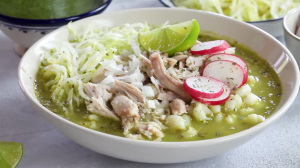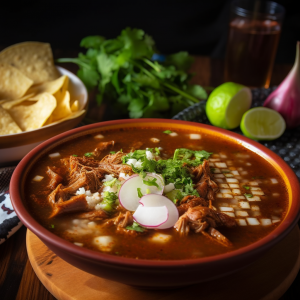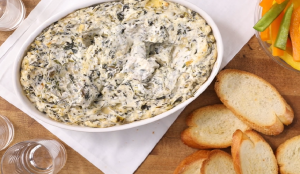The Pressure Cooker Pozole: Pork and Hominy Stew Recipe delivers a delightful blend of flavors where tender pork shoulder meets the earthy richness of hominy, all beautifully accentuated by spices. This stew is a comforting dish that's perfect for those cold winter nights, bringing the warmth of Mexican culinary tradition right to your table.
One ingredient that might not be commonly found in your pantry is hominy. Hominy is dried corn kernels that have been treated with an alkali. Its unique texture and flavor play a vital role in Pozole. Look for it in the canned vegetables aisle in your supermarket. The other crucial ingredient is pork shoulder, which provides rich flavor and tenderizes beautifully under pressure.
Key Ingredients for Pressure Cooker Pozole: Pork and Hominy Stew Recipe
Pork shoulder: This is the star of the show. The pork shoulder, also known as Boston butt, is a flavorful, fatty cut of meat that becomes tender and juicy when slow-cooked.
Hominy: Hominy is the cornerstone of pozole. It adds a unique, slightly sweet and earthy flavor to the stew.
White onion: Gives a base flavor to the stew. It's subtly sweet and savory.
Garlic cloves: These add depth of flavor and a hint of heat.
Chili powder: This spice blend adds a smoky, spicy flavor to the stew.
Chicken broth: It adds depth and richness to the stew. You can use homemade or store-bought.
Avocado: Avocado adds creaminess and a fresh flavor to the dish.
Cilantro: This herb lends a fresh, citrusy flavor, making it a perfect garnish for this hearty stew.
One reader, Kennith Weigel says:





This pressure cooker pozole recipe is a game-changer! The pork was incredibly tender and flavorful, and the hominy added a delightful texture. The dish was easy to prepare and the flavors were spot on. It's a must-try for anyone who loves a hearty and delicious stew.
Techniques Required for Making Pressure Cooker Pozole
How to brown the pork: Heat the oil in the pressure cooker and cook the pork for about 8 minutes or until the pieces are browned on all sides. Transfer the pork to a plate.
How to sauté the onion, garlic, and chili powder: After browning the pork, add the remaining oil, onion, garlic, and chili powder to the pressure cooker. Sauté for about 4 minutes, until the vegetables are soft.
How to cook under high pressure: After adding the broth and water, secure the lid of the pressure cooker and cook under high pressure for about 45 minutes until the meat is tender.
How to skim fat: After removing the pressure cooker from heat and venting the pressure, skim any excess fat from the surface of the stew before adding the hominy.
How to shred the pork: Using two forks, shred the cooked pork before stirring in the hominy and heating the stew through.
How to serve: Serve the pressure cooker pozole with avocado and lime, and garnish with cilantro.
How To Make Pressure Cooker Pozole (Pork and Hominy Stew)
This pozole recipe is essentially a stew of pork and hominy that is flavored with onion, garlic, chili powder, and served with wedges of avocado and lime.
Serves:
Ingredients
- 1¼lbpork shoulder,boneless, trimmed of fat and cut into 4-inch pieces
- kosher salt and fresh cracked pepper
- 1tbspolive oil,divided
- 1mediumwhite onion,chopped
- 4garlic cloves,minced
- 2tbspchili powder
- 4cupschicken broth,low sodium
- 2cupswater
- 15ozhomin,(2 cans), drained and rinsed
- 4ozavocado,diced, and lime wedges, for serving
- cilantro,for garnish
Instructions
-
Season the pork with salt.
-
Press saute and heat half of the oil.
-
Add the pork and cook for about 8 minutes or until pieces are browned on all sides; transfer to a plate.
-
Add remaining oil, onion, garlic, and chili powder and sauté for about 4 minutes, until soft.
-
Add broth and water, cook, stirring and scraping up browned bits with a wooden spoon.
-
Return pork to the pressure cooker. Secure lid.
-
Cook high pressure for about 45 minutes until meat is tender. Quick or natural release.
-
Remove from heat, vent pressure, then remove lid.
-
Skim fat if any.
-
Using two forks, shred pork; then stir in hominy and heat through.
-
Serve with avocado and lime and garnish with cilantro.
Nutrition
- Calories: 352.29kcal
- Fat: 24.41g
- Saturated Fat: 7.21g
- Monounsaturated Fat: 12.10g
- Polyunsaturated Fat: 2.97g
- Carbohydrates: 11.82g
- Fiber: 2.94g
- Sugar: 3.68g
- Protein: 21.53g
- Cholesterol: 71.89mg
- Sodium: 889.63mg
- Calcium: 48.14mg
- Potassium: 666.70mg
- Iron: 2.16mg
- Vitamin A: 57.39µg
- Vitamin C: 5.89mg
Crucial Technique for Perfect Pressure Cooker Pozole
When shredding the pork, it's best to let it cool slightly before using two forks to pull it apart. This not only makes it easier to handle but also allows the meat to absorb some of the juices, making your pozole even more flavorful. Additionally, when sautéing the onion and garlic, be sure not to let them brown too much as this could give your stew a bitter taste. Instead, aim for a soft and translucent texture.
Time-Saving Tips for Preparing Pozole
Prep ahead: Chop vegetables and measure out ingredients in advance to streamline the cooking process.
Use pre-cut meat: Save time by purchasing pre-cut pork shoulder to skip the step of cutting it yourself.
Quick release: Opt for the quick release method to reduce the time it takes for the pressure cooker to depressurize.
Multi-task: While the pork is cooking, prepare the garnishes and set the table to make the most of your time.
Invest in a good pressure cooker: A high-quality pressure cooker can significantly reduce cooking time and make the process more efficient.
Substitute Ingredients For Pressure Cooker Pozole (Pork and Hominy Stew) Recipe
pork shoulder - Substitute with beef chuck roast: Beef chuck roast can be used as a substitute for pork shoulder in this recipe. It has a similar rich and flavorful profile and will work well in the pressure cooker to create a tender and succulent stew.
chicken broth - Substitute with vegetable broth: Vegetable broth can be used as a substitute for chicken broth to make the recipe vegetarian-friendly while still providing a flavorful base for the stew.
hominy - Substitute with canned white or yellow corn: Canned white or yellow corn can be used as a substitute for hominy, providing a similar texture and sweetness to the stew.
Presentation Tips for Serving Pozole
Elevate the plating: When presenting the pressure cooker pozole, focus on creating an elegant and visually appealing arrangement on the plate. Use fresh cilantro and sliced avocado to add vibrant colors and textures to the dish.
Incorporate artistic drizzling: Enhance the visual appeal of the dish by delicately drizzling a swirl of chili oil around the edge of the bowl. This not only adds a touch of sophistication but also infuses a hint of heat to the overall presentation.
Balance the elements: Pay attention to the balance of the components in the bowl, ensuring that each ingredient is thoughtfully placed to create a harmonious composition. Arrange the shredded pork and hominy in a way that showcases their individual textures and colors.
Utilize negative space: Embrace the concept of negative space on the plate to allow the vibrant colors of the pozole to stand out. This will draw attention to the rich, flavorful broth and the tender, succulent pork.
Garnish with precision: Add a final touch of finesse by garnishing the dish with meticulously placed microgreens and a sprinkle of smoked paprika. These subtle details will elevate the overall presentation and demonstrate attention to detail.
Essential Kitchen Tools for Making Pozole
- Pressure cooker: A kitchen appliance used to cook food quickly under steam pressure.
- Wooden spoon: A utensil used for stirring and mixing ingredients.
- Forks: Utensils used for shredding the pork and stirring the stew.
- Knife: Used for cutting and chopping ingredients.
- Cutting board: Surface for cutting and preparing ingredients.
- Measuring cups and spoons: Used for accurately measuring ingredients.
- Ladle: Used for serving the stew.
- Tongs: Used for handling and serving the pork.
- Plates and bowls: For serving the pressure cooker pozole.
- Skimmer or fat separator: Used for skimming fat from the stew.
Storing and Freezing Pozole for Later
- Let the pozole cool completely before storing or freezing.
- For storing in the refrigerator:
- Transfer the cooled stew to an airtight container.
- It will keep well in the fridge for up to 4 days.
- Reheat gently on the stovetop or in the microwave until heated through before serving.
- For freezing:
- Portion the cooled pozole into freezer-safe containers or resealable bags.
- Leave some space at the top for expansion during freezing.
- Label the containers with the date and contents.
- Freeze for up to 3 months for best quality.
- To reheat, thaw the pozole overnight in the refrigerator.
- Transfer to a pot and reheat gently on the stovetop until heated through.
- If the stew appears too thick after thawing, add a little chicken broth or water to thin it out to your desired consistency.
- It's best to store the toppings, such as avocado, lime, and cilantro, separately and add them fresh when serving the reheated pozole.
How To Reheat Pozole Leftovers
To reheat leftover pozole, start by transferring the desired amount into a microwave-safe bowl. Cover the bowl with a damp paper towel to prevent the stew from drying out. Microwave on high for 1-2 minutes, stirring occasionally, until heated through.
For a stovetop method, place the leftover pozole in a saucepan over medium heat. Add a splash of chicken broth or water to help loosen the stew and prevent it from sticking to the bottom of the pan. Stir frequently and heat until the pozole is warmed through, about 5-7 minutes.
If you have a lot of leftover pozole, you can reheat it in a slow cooker. Transfer the pozole to the slow cooker, add a little extra broth if needed, and heat on low for 2-3 hours or until the stew is heated through.
For a crispy twist, try reheating the pork separately in a skillet over medium-high heat with a little olive oil. Cook until the pork is crispy and heated through, then add it back to the reheated hominy and broth.
No matter which method you choose, be sure to taste the reheated pozole and adjust the seasoning as needed. You may want to add a squeeze of fresh lime juice, a sprinkle of chili powder, or a handful of chopped fresh cilantro to brighten up the flavors.
Interesting Fact About Pozole
Pozole is a traditional Mexican soup or stew made from hominy, with pork as the main protein. It is often served at celebrations and gatherings, and its origins can be traced back to pre-Columbian times. The dish has a rich history and is an important part of Mexican culinary heritage.
Is Making Pozole at Home Cost-Effective?
This pressure cooker pozole: pork and hominy stew recipe is quite cost-effective for a household. The use of affordable ingredients like pork shoulder and hominy makes it a budget-friendly option. The versatility of the dish also allows for easy customization based on available resources. The approximate cost for a household of 4 people would be around $20-$25. The overall verdict for this recipe would be an 8 out of 10, considering its affordability, delicious flavors, and hearty nature.
Is Pressure Cooker Pozole Healthy or Unhealthy?
This pozole recipe has both healthy and unhealthy aspects. Here's a breakdown:
Healthy elements:
- Pork shoulder is a good source of protein
- Onion and garlic provide flavor and some nutrients
- Chicken broth adds flavor and can be low in fat if using a reduced-fat version
- Hominy is a good source of fiber and various vitamins and minerals
- Avocado provides healthy fats and fiber
- Cilantro adds fresh flavor and some vitamins
Unhealthy aspects:
- Pork shoulder is relatively high in saturated fat
- The recipe doesn't include many vegetables, which would provide additional nutrients and fiber
- Depending on the amount of salt used, the sodium content could be high
To make this recipe healthier:
- Trim excess fat from the pork shoulder to reduce the saturated fat content
- Use a reduced-sodium chicken broth to lower the overall sodium content
- Add more vegetables to the stew, such as diced carrots, celery, or bell peppers, to increase the nutrient and fiber content
- Use a leaner cut of pork, such as pork loin, to reduce the fat content further
- Serve the pozole with a side salad or additional steamed vegetables to make it a more well-rounded meal
Additionally, you could experiment with using different types of chili powder or adding other spices like cumin or oregano to enhance the flavor without relying on salt. Topping the pozole with a dollop of Greek yogurt instead of sour cream would also provide a protein and calcium boost while reducing the fat content.
Editor's Opinion on This Pozole Recipe
This pressure cooker pozole recipe is a delightful twist on the traditional Mexican stew. The use of pork shoulder adds rich flavor and tenderness, while the hominy provides a satisfying texture. The combination of chili powder, garlic, and onion creates a robust and aromatic base for the stew. The addition of avocado and cilantro adds a fresh and vibrant finish. Overall, this recipe is a wonderful fusion of flavors and textures, making it a perfect choice for a comforting and hearty meal.
Enhance Your Pressure Cooker Pozole (Pork and Hominy Stew) Recipe with These Unique Side Dishes:
Similar Recipes to Pressure Cooker Pozole
Appetizer and Dessert Pairings for Pozole
Why trust this Pressure Cooker Pozole (Pork and Hominy Stew) Recipe:
This pressure cooker pozole recipe offers a perfect balance of flavors and textures, ensuring a delightful dining experience. The succulent pork shoulder is seasoned to perfection, while the aromatic blend of chili powder, onion, and garlic infuses the dish with rich, savory notes. The use of high-quality chicken broth and hominy guarantees a hearty and satisfying stew. With the addition of creamy avocado and fresh cilantro, this recipe promises a harmonious fusion of traditional and contemporary elements, making it a trustworthy choice for a delicious and authentic Mexican cuisine experience.
Was this page helpful?
Have your own special recipe to share? Submit Your Recipe Today!














